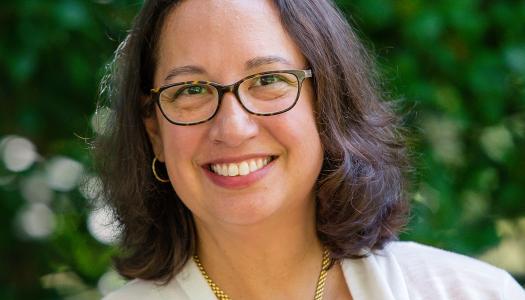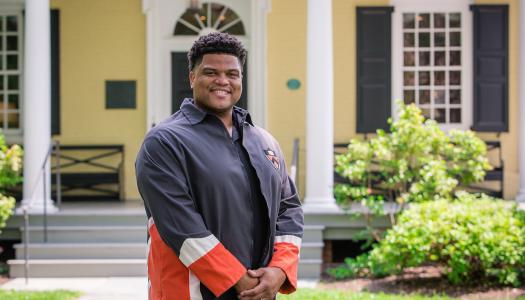Jennifer Morton ’02 talks about how colleges can support first-generation students
Her book, “Moving Up Without Losing Your Way,” is this year’s Princeton Pre-read.
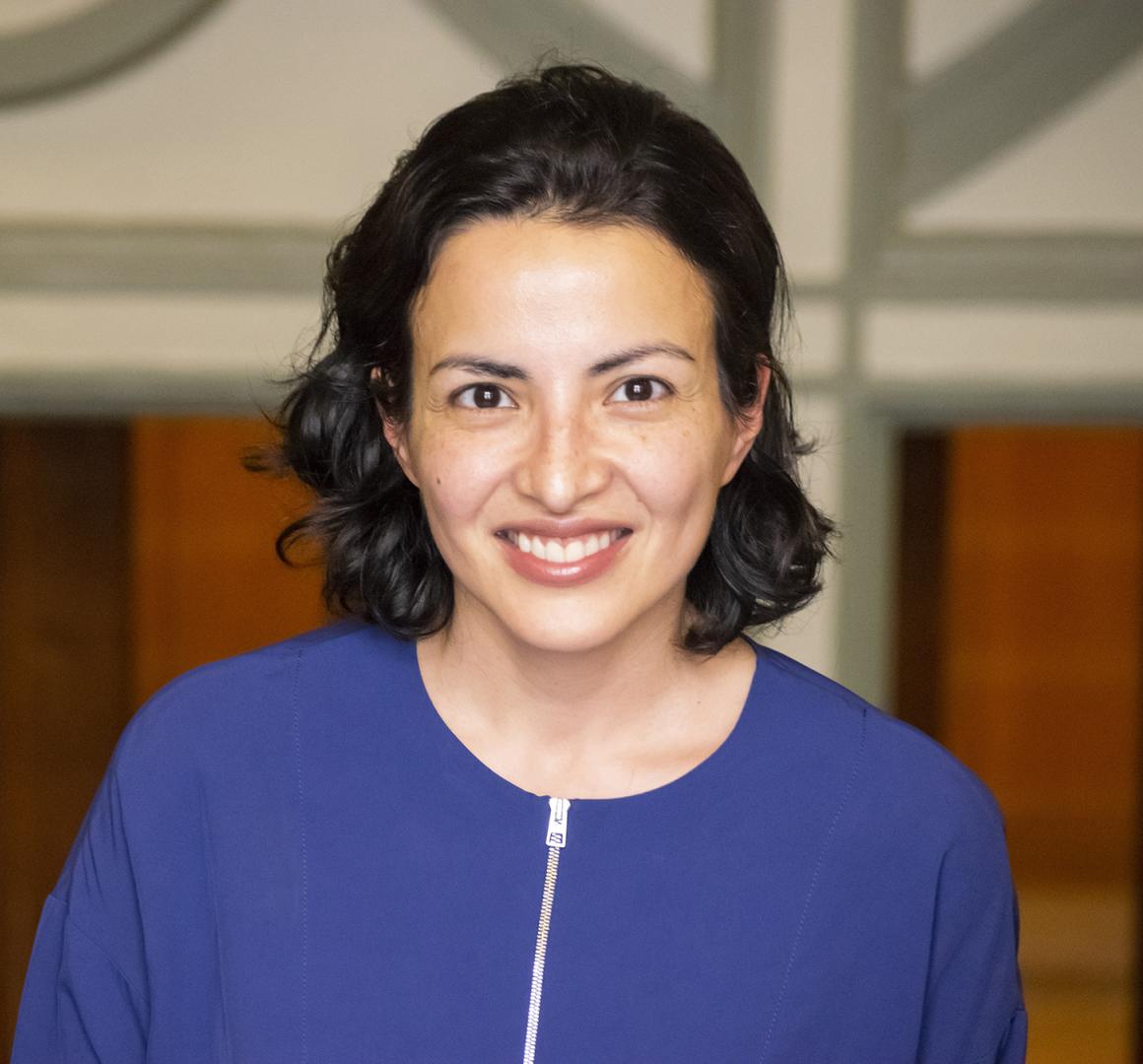
Jennifer Morton ’02 was a first-generation college student during a time when that term wasn’t yet widely recognized or understood. Born in Peru, she adjusted to Princeton and a new country with the help of college friends who appreciated her occasional misunderstandings and malaprops. Like the time she misheard one friend describe her tight financial position as “in the bread.”
“To me, it made sense: bread is a symbol of something you might want, like, money,” Morton said with a chuckle. “She’s in the bread. Or maybe she’s eating only bread because she can’t afford anything else. And, of course, later, a friend said, “In the red! In the red! That’s the expression we use here.”
The story still makes Morton smile. But after becoming a university professor and teaching first-generation, lower-income students, she realized that even harmless misunderstandings have the potential to discourage students from unconventional backgrounds. “There’s the assumption that you’re in college for a reason, and you’re the best and the brightest or whatnot,” Morton said. “Yet these little moments can take on such significance in making you feel like, ‘Maybe I really don’t belong here,’ and become magnified in the minds of students.”
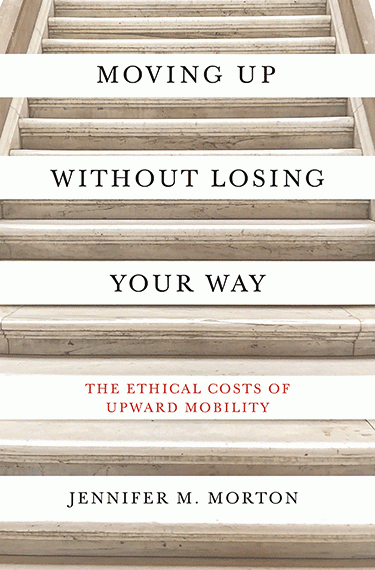
Morton, who has been named the Presidential Associate Professor of Philosophy at the University of Pennsylvania and is a senior fellow at the Center for Ethics and Education at the University of Wisconsin-Madison, reflected on her days as a Princeton student for her new book, “Moving Up Without Losing Your Way: The Ethical Costs of Upward Mobility.” The book, which was awarded the Frederic W. Ness Book Award by the Association of American Colleges, examines the challenges that disadvantaged college students face as they pursue upward mobility and discusses how colleges and universities can do more to help these students thrive on campus and after graduation.
In April, President Christopher L. Eisgruber ’83 announced that “Moving Up” had been selected as the Princeton Pre-read for the Class of 2025, making Morton the first Latinx author to be selected for the honor. “It was very exciting and unexpected,” said Morton, who began writing the book when she was a Laurance S. Rockefeller Visiting Faculty Fellow at Princeton’s Center for Human Values in 2015-16. “It’s great to know that my book will be in the hands of so many people.”
Morton studied philosophy at Princeton and received her Ph.D. from Stanford University. She has taught philosophy at Swarthmore College, City College of New York – CUNY, and the University of North Carolina. In an interview conducted on Zoom, Morton spoke about her career as a philosopher and how her own student experience became an essential aspect of “Moving Up.”
What inspired you to pursue a career in philosophy?
At the American High School in Peru, I had this wonderful teacher, Leilani Hall, a poet who taught a class called Theory of Knowledge and introduced the idea of the original position and the philosophy of John Rawls through a game. I still remember how excited I was to think about stuff in that way. At Princeton, I took every 101 class — SOC101, PSY101 — to figure out what I wanted to do, but in the end, I felt like philosophy was the place where I was learning really valuable argumentative and writing skills that would serve me in any kind of intellectual endeavor. I think philosophy has room for people who have a lot of different interests. You can think philosophically about politics or about science or about higher ed or anything else.
How did it feel to write about your own Princeton experiences within the framework of this book?
It wasn’t really supposed to be a part of the story. Initially, I was writing a very academic book, much more geared towards researchers thinking about higher education. But as I was working through the book with a developmental editor, he encouraged me to think about who I was really writing this for. I didn’t want the book just to be read by other academics. Narratives and stories have an important role to play in communicating ideas. I’m a first-generation college student; my story proved to be a useful starting point. And, furthermore, so many wonderful strivers were willing to share their stories with me, so I thought I should be willing to share my story as well. I had to unlearn writing in the style of academic philosophy in order to communicate these ideas in a way that would lead a first-generation college student that reads the book to think, “Oh, yes, I see myself here.” And as I wrote my story for others, I found myself retelling my own story to myself. That was cathartic.
Getting students to open up to you about their lives requires a skill that goes beyond being a philosopher or a teacher. How did that relationship get to the point where they felt comfortable sharing?
I had to cultivate it. A lot of my students at City College really needed me to teach – and not just to lecture. So I really had to learn how to be a better teacher. To get them to trust me requires that you focus on creating a certain class environment. And that’s not just about my relationship with the students, but about trying to get them to relate to each other in a way where they feel comfortable, where they feel that the classroom is a nurturing place for them to try out ideas. I had to go from thinking that my role was embodying this authority figure at the front of the class to realizing that my students were going to be better served if I let down my guard a little and I was a little bit more open with my students about being a first-generation college student myself. I also struggled with some aspects of adjusting to college. It was valuable for them to know that. It helped students feel more comfortable sharing their own experiences with me.
I think one of the most important takeaways in the book is the notion that for many first-generation, lower-income students, attending an elite college can be both a life-changing opportunity and a painful sacrifice. The idea that success may come at the expense of some of the things that students hold dear. Was that a notion that you always understood?
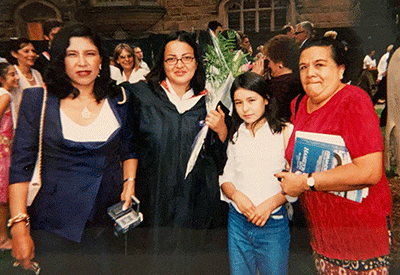
I don’t think I fully understood that aspect of it until I was a professor myself and thinking about my students’ experiences and the challenges that they were facing. I had to some extent made that trade-off myself but not the same extent that they had. At the time, I didn’t have the tools to conceptualize it in that way. When I got to Princeton, I don’t even remember first-generation college students being a thing we talked about. So I don’t think I had the language to fully understand that until I was on the other side. Some of the students that I was teaching when I was at City College were still doing things for their families, like working, taking care of younger siblings, doing eldercare. Their families really depended on them to do a lot of this work while they were in college. Talking to them and realizing how hard it was for them to prioritize their own educational and career goals, while also being there for their families, really helped me see, in retrospect, how much distance I had created between the world in which I grew up and myself as a consequence of the path I had taken.
Was that experience at City College a surprise? At that point, you had studied at Princeton and Stanford, and you had taught at Swarthmore.
Yes, it was eye-opening. Because as you said, I had been at places that had so many resources, and where the students are living on campus. In those spaces, you don’t see the effect that students’ lives back home are having on their educational trajectory to the same extent. Whereas when I was at City College, my students’ lives were constantly being revealed: They couldn’t come and take a test because they had to babysit for a cousin, or they had to miss office hours appointment because another thing popped up at home. The students were really navigating those conflicts on a day-to-day basis.
But it’s also the huge differences in resources between a public university and elite private universities. As a professor, when a student is facing a challenge and you’re trying to mobilize resources to help them, that’s when you really notice the difference. At Swarthmore, I could call a dean and say, “I think this student is having trouble,” and a whole host of people would get involved and try to figure out how they could help the student. Whereas when I was a CUNY, you end up sitting there thinking about what your students are going through and feeling really hamstrung because there simply aren’t the same resources you can mobilize. In terms of student support services and how students are able to navigate through the university, the differences are pretty stark.
I stole this stat from the Hidden Brain podcast you did, but only 21% of lower-income, first-generation students who enroll in college actually finish, compared to about 50% of other students. What do you think colleges and universities can do better, not just to open doors, but to support strivers after they arrive on campus so that they can graduate and go on to a fulfilling career?
I think the first thing to note about that statistic is that it varies greatly depending on the institution. At a place like Princeton, the completion rates for first-generation college students are incredibly high, but the completion rates at a place like City College, or the Cal State system or University of Texas are going to be lower. I think that tells us the first big thing we need to know, which is when you have a lot of resources to support students who might be struggling because of other issues they are facing, you can still get those high completion rates. You just need a lot of resources to offer students the support they need. So I think redirecting resources to those public institutions to support students is really critical — especially the institutions that are serving this population of students and doing it relatively well given their limited resources. The solution has to be more systematic. It has to be at the level of the higher education system, not just individual institutions.
That being said, one piece that often gets missed is teaching. At a lot of universities, professors in certain classes that are prerequisites for degrees in the sciences or pre-med — Chemistry 101, Physics 101 — are supposed to fail half or a third of the class. The class is not designed to help a student who might fail; the class is designed to weed out students. That’s built into the pedagogical model. So what ends up happening in classes like that is that students who come from high schools that didn’t offer as many advanced math and science classes are at a disadvantage. For some students who wanted to be pre-med or engineers, that class could derail their undergraduate career. They might decide it’s not worth continuing. I would focus more on making sure that professors are getting the pedagogical training they need to support students who are from low-income, first-generation backgrounds. We should really put our resources in institutions that serve first-generation and low-income students, on bolstering support systems for those students, and on teaching. That is how we help students cross the finish line.
This summer, about 1,300 Princeton students are going to read your book. What do you hope that they get out of it?
What I hope that they get out of it is a better understanding of the experiences that other students are bringing to campus. Specifically, those students who come from more privileged backgrounds and maybe don’t fully understand what the low-income or first-generation college students are dealing with. Sometimes it’s too easy not to notice or pay attention to the fact that people are having a very different experience of campus, depending on where they come from and what’s going on back home. We’re constantly making assumptions that the students around us are like us, that they’re having a very similar experience. But that might not be true. So hopefully, the book will enable students to not silo themselves so much during their four years of Princeton. I want to encourage students to broaden their horizons and push themselves to form connections with students from different backgrounds.
Research-wise, what do you hope to tackle next?
I’m hoping to write a book about how people can use a humanist liberal arts education after college in service of the public good. When I was an undergraduate, I wasn’t entirely sure what I was supposed to do with my degree afterwards. There are the career paths that we think about — lawyer, teacher, investment banking — but there are many other career paths where people use the wisdom gained from a liberal arts education to give back to their community and to be engaged with others and do good in the world. Hopefully, a book with these stories will inspire undergraduates who read it to think a little bit more broadly about what they can do after college.

